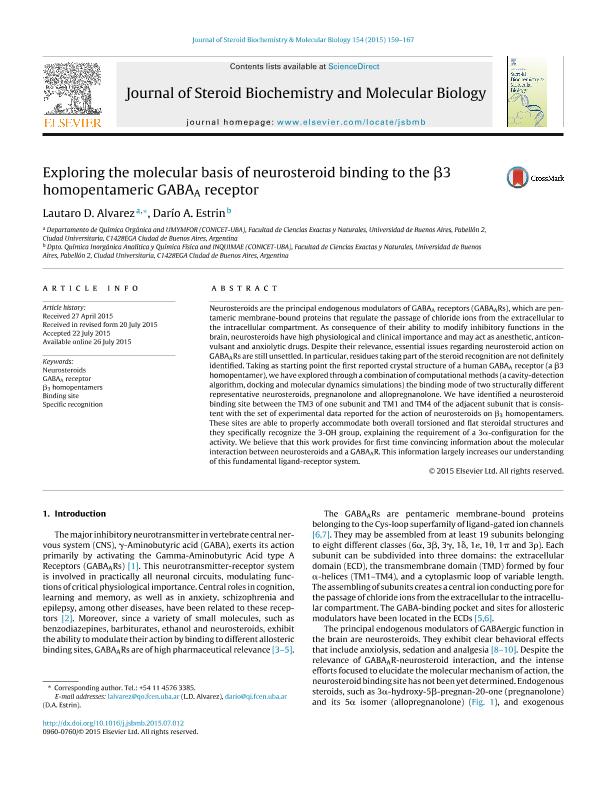Mostrar el registro sencillo del ítem
dc.contributor.author
Alvarez, Lautaro Damian

dc.contributor.author
Estrin, Dario Ariel

dc.date.available
2017-06-22T18:10:02Z
dc.date.issued
2015-11
dc.identifier.citation
Alvarez, Lautaro Damian; Estrin, Dario Ariel; Exploring the molecular basis of neurosteroid binding to the β3 homopentameric GABAA receptor; Elsevier; Journal of Steroid Biochemistry and Molecular Biology; 154; 11-2015; 159-167
dc.identifier.issn
0960-0760
dc.identifier.uri
http://hdl.handle.net/11336/18662
dc.description.abstract
Neurosteroids are the principal endogenous modulators of GABAA receptors (GABAARs), which are pentameric membrane-bound proteins that regulate the passage of chloride ions from the extracellular to the intracellular compartment. As consequence of their ability to modify inhibitory functions in the brain, neurosteroids have high physiological and clinical importance and may act as anesthetic, anticonvulsant and anxiolytic drugs. Despite their relevance, essential issues regarding neurosteroid action on GABAARs are still unsettled. In particular, residues taking part of the steroid recognition are not definitely identified. Taking as starting point the first reported crystal structure of a human GABAA receptor (a β3 homopentamer), we have explored through a combination of computational methods (a cavity-detection algorithm, docking and molecular dynamics simulations) the binding mode of two structurally different representative neurosteroids, pregnanolone and allopregnanolone. We have identified a neurosteroid binding site between the TM3 of one subunit and TM1 and TM4 of the adjacent subunit that is consistent with the set of experimental data reported for the action of neurosteroids on β3 homopentamers. These sites are able to properly accommodate both overall torsioned and flat steroidal structures and they specifically recognize the 3-OH group, explaining the requirement of a 3α-configuration for the activity. We believe that this work provides for first time convincing information about the molecular interaction between neurosteroids and a GABAAR. This information largely increases our understanding of this fundamental ligand-receptor system.
dc.format
application/pdf
dc.language.iso
eng
dc.publisher
Elsevier

dc.rights
info:eu-repo/semantics/openAccess
dc.rights.uri
https://creativecommons.org/licenses/by-nc-nd/2.5/ar/
dc.subject
Neurosteroids
dc.subject
Β3 Homopentamers
dc.subject
Binding Site
dc.subject.classification
Química Orgánica

dc.subject.classification
Ciencias Químicas

dc.subject.classification
CIENCIAS NATURALES Y EXACTAS

dc.title
Exploring the molecular basis of neurosteroid binding to the β3 homopentameric GABAA receptor
dc.type
info:eu-repo/semantics/article
dc.type
info:ar-repo/semantics/artículo
dc.type
info:eu-repo/semantics/publishedVersion
dc.date.updated
2017-06-22T17:37:11Z
dc.journal.volume
154
dc.journal.pagination
159-167
dc.journal.pais
Países Bajos

dc.journal.ciudad
Amsterdam
dc.description.fil
Fil: Alvarez, Lautaro Damian. Consejo Nacional de Investigaciones Científicas y Técnicas. Oficina de Coordinación Administrativa Ciudad Universitaria. Unidad de Microanálisis y Métodos Físicos en Química Orgánica. Universidad de Buenos Aires. Facultad de Ciencias Exactas y Naturales. Unidad de Microanálisis y Métodos Físicos en Química Orgánica; Argentina
dc.description.fil
Fil: Estrin, Dario Ariel. Consejo Nacional de Investigaciones Científicas y Técnicas. Oficina de Coordinación Administrativa Ciudad Universitaria. Instituto de Química, Física de los Materiales, Medioambiente y Energía. Universidad de Buenos Aires. Facultad de Ciencias Exactas y Naturales. Instituto de Química, Física de los Materiales, Medioambiente y Energía; Argentina
dc.journal.title
Journal of Steroid Biochemistry and Molecular Biology

dc.relation.alternativeid
info:eu-repo/semantics/altIdentifier/doi/http://dx.doi.org/10.1016/j.jsbmb.2015.07.012
dc.relation.alternativeid
info:eu-repo/semantics/altIdentifier/url/http://www.sciencedirect.com/science/article/pii/S096007601530025X
Archivos asociados
